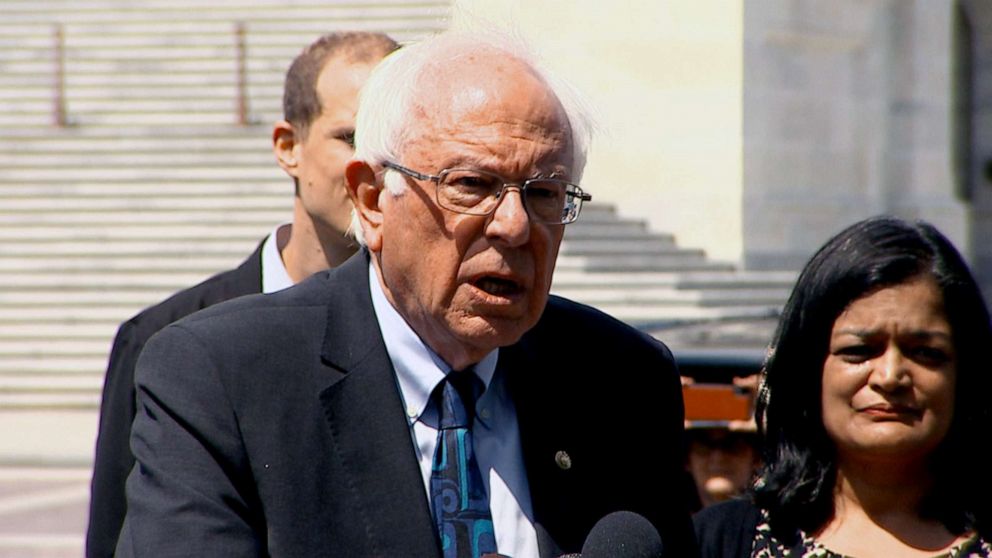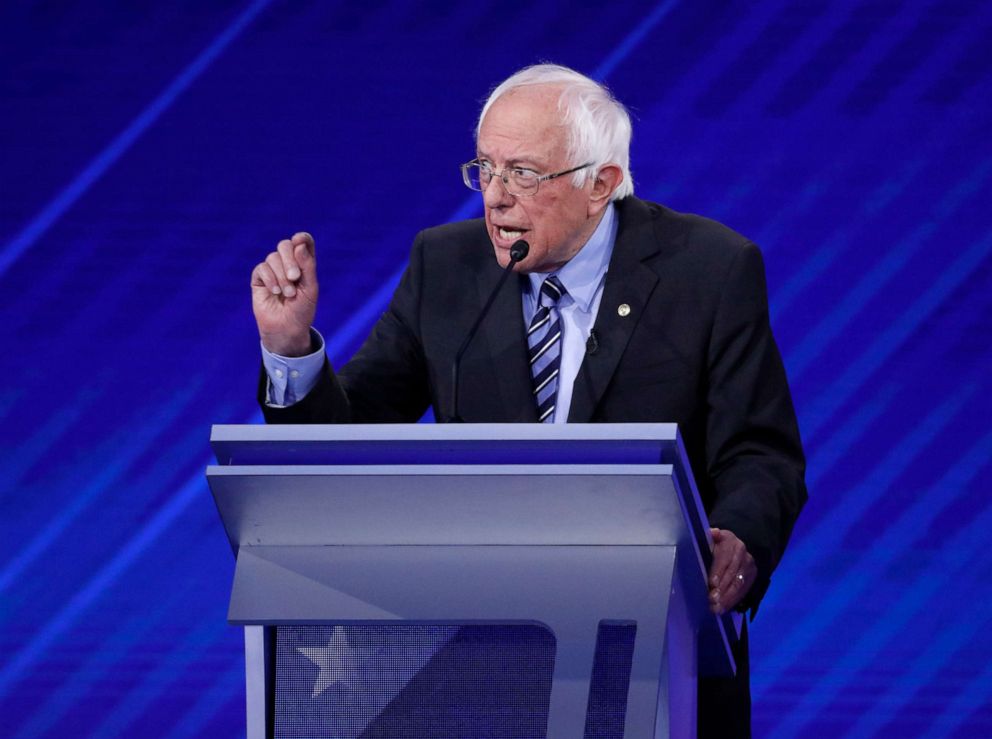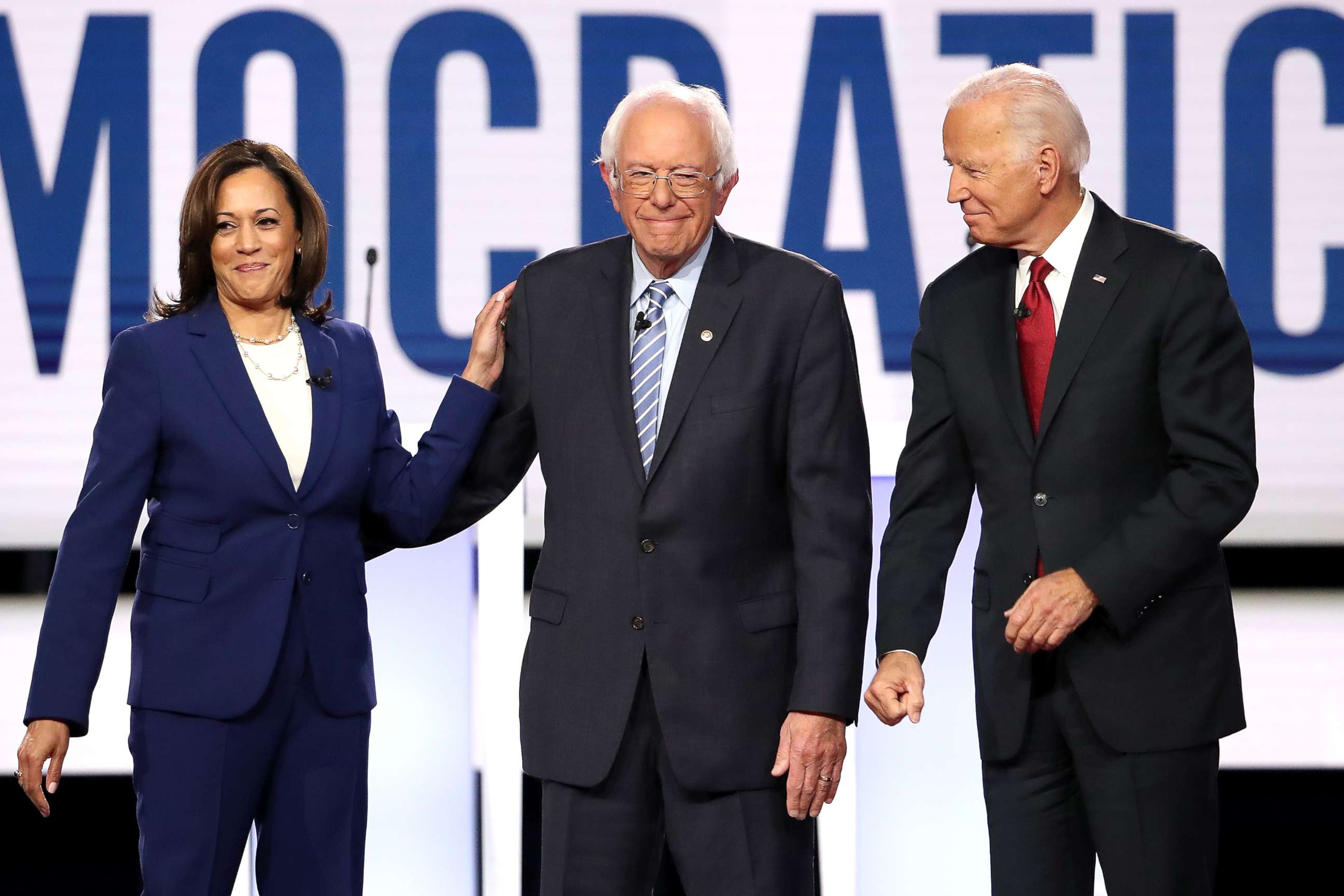Sen. Bernie Sanders' complicated legacy -- new recruits and party divisions: ANALYSIS
He suspended his presidential bid on Wednesday.
On January 20, 2018, Elizabeth Guzman was sworn in as a new delegate in the Virginia House of Delegates. A single mom when she first immigrated to the US from Peru, Guzman worked as a social worker before she took a huge leap of faith and ran for office for the first time in 2017.
After defeating an eight-term incumbent Republican, she stood in the historic Virginia statehouse as the first Latina ever to serve in that role and thanked one man in particular for inspiring her.
“There was this one person, who is Sen. Bernie Sanders,” Guzman said that first day in the chamber.
“Thank you for helping me find and ignite the fire within me and to remember that we should stick to our values,” she went on, as if speaking directly to the Vermont Senator who had lost his first presidential bid just months before Guzman started her own campaign.
Guzman served this past year as a state director for Sanders’ 2020 campaign and is one of tens of thousands of Americans who have felt uniquely motivated by Senator Bernie Sanders to get involved in politics in new ways whether it be to attend a political rally for the first time, donate to a campaign, or running for office themselves.
“We never thought people who look like me - immigrants, more women, working class individuals could run and win. He told us we could,” Guzman told ABC News on the phone this week.

“He ran on personal issues that effect our daily lives. I remember listening to his story about being an immigrant and the struggles he faced: his family’s small apartment, their struggle with health care, his father working two or three jobs. It went directly to my heart. He knows and understand my struggles, because he lived it,” she added.
In a video endorsing Sanders’ most recent presidential bid, New York Rep. Alexandria Ocasio-Cortez, too, credited Sanders for changing her life. She said she first heard about the senator when she was working as a waitress in Manhattan. “I had been working twelve hours days. I did not have health insurance. I was being paid less than a living wage,” she said, “The only reason I thought running for office was even possible for me was because of his example.”
The list goes on.
Heidi Harmon was a community organizer who served as a delegate for Sanders at the 2016 Democratic National Convention and then, moved by Sanders’ work and his words, went on run for Mayor of San Luis Obispo, California that year and win. She told ABC News during her first campaign, “This is what Bernie is asking us to do.” She won re-election in 2018 and is still serving as the city’s mayor now.
Sanders has said many times over the years that he hoped this would be his lasting legacy -- that people from all backgrounds, especially people new to politics, with working class backgrounds, would get in off the sidelines and into the political arena.
“We need new blood in the political process,” he told supporters in June 2016, while winding down his first presidential campaign. “You are that new blood.”
During that same video address, Sanders directed viewers to a new part of his website with resources for those interested in running for office at any level. That summer too senior members of his 2016 campaign went to start a political advocacy organization, Our Revolution, dedicated to recruiting, vetting, and funding progressive candidates, many new to politics.

In this effort, he undoubtedly succeeded.
A lasting part of his legacy will be a new generation of progressive candidates and voters that expanded that size and scope of the Democratic Party. At every one of his events there are Americans who had previously not felt included or interested in politics, but who saw an authenticity in Sanders that drew them in and made them feel welcomed.
Sanders’ team fostered this inclusivity in many ways: starting events with shocking punctuality for a political team and making a habit of positioning local volunteers, familiar to the neighborhood at every door. Sanders said he started on time out of respect for people who took time off work or family responsibilities to be present. He saw working class people and made them feel seen.
Former North Dakota Senator and ABC News contributor Heidi Heitkamp described Sanders as the leader of a movement, one that often function outside and in often at odds with the Democratic Party.
“It has not necessary been a Democratic Party movement, but a populist, progressive movement,” Heitkamp reflected. “It represented a hope in this country of changing the economic disparities through political action… and the movement never moved away from him”
Heitkamp added that his legacy has been tainted, though, by the aggressiveness of those who follow him.
Sanders has often had to answer for bullying, disruptive and, at times, even threatening behavior online by people who defend him and his causes. “There was a sense that you can’t compromise among the righteous… it was almost a cult following he had,” Heitkamp explained.
More, she said among Senate and Democratic colleagues, “Sanders was not seen as a team player.”

Sanders gave voice and a safe space to Democrats and independents who harbored criticisms of President Obama administration or felt let down by his administration.
During his 2016 campaign, Sanders was openly critical of the outgoing president and argued that too many working class and poor Americans, especially in the industrial Midwest, had suffered during Obama’s presidential with job losses and a lack of pay increases. Sanders ran against Obama’s latest, proposed trade deal, his talk of “clean coal,” and what Sanders’ saw as shortcomings in the Affordable Care Act.
More, he mused that it would have been a good idea if Obama has faced a primary challenge during his re-election campaign, and many Democrats worried at the time that the senator was seriously considering it himself.
Still, as the longest-serving independent in the history of Congress, it is notable how Sanders influenced how the Democratic Party now operates and which policies it supports.
Sanders and his team were offered a seat at the table to help rewrite the rules governing the Democratic Party and its presidential nominating process after the 2016 cycle. They advocated alongside others for the party to limit the role of the so-called “super-delegates” and won serious concessions. This cycle those party members and election officials, who had enjoyed their own vote at past conventions on par with elected delegates, were relegated to more of a symbolic role in this nominating process.
Sanders’ team in 2016 and 2017 also pushed the party to incentivize states away from holding caucuses and towards primaries instead. It was an interesting move that arguably demonstrated an intellectual purity and consistency among his team, because Sanders had actually done exceptionally well in caucus contests and would likely benefit from them should he run again. His team said caucusing had become disenfranchising for the average voter and primaries were more democratic.
On a smaller scale too, his team won victories in how the state parties would report results, be more transparent and encourage states to cluster their primaries regionally. These were all changes designed to give smaller, lesser known and insurgent campaigns a leg-up in future elections.
Sanders lost a number of other battles with the party over rules and regulations, but his advocacy, and that of his supporters, changed the culture at the Democratic National Committee in other ways too. For example, those closely aligned with him pushed the party to rethink its work with corporate donors and consider places where there had been conflict-of-interest between consultants working for some campaigns, or some large companies, and the party.
Similarly, while Sanders did not ultimately convince all Democratic campaigns to forgo the use of Super PACs, organizations outside traditional campaigns that allow for undisclosed campaign donors, he publicly shamed and challenged his opponents to rethink taking support from them.
Sanders modeled his fundraising off of the incredible success that Senator Elizabeth Warren had had during her first Senate campaign. Following in her footsteps, he too was able to foster and harness millions of small dollar donors, who committed to give regularly to his campaign. The two of them, both ardent progressives, demonstrated that grassroots campaigns could work in a modern era against other campaigns flushed with cashed.
As Sanders’ ends his second presidential campaign, his mark on the platform and agenda of the Democratic Party is apparent too.
“Bernie Sanders has transformed the national health care debate, making ideas that are hardly modest by historical standards seem like the moderate alternative,” Larry Levitt, Executive Vice President for Health Policy at the Kaiser Family Foundation told ABC News. “An optional public health insurance program, which couldn’t pass when the Affordable Care Act was being debated in Congress, is now more in the realm of possibilities.”
Although many elected Democrats remain adamantly opposed to Sanders’ signature proposal for a single-payer, government run health insurance program, the senator sparked a national conversation about the shortcomings of the current health care system in the country and gave voice and social acceptance to those arguing for fundamental and sweeping change.
The current global pandemic too resurfaced and underscored his message about the the cost of health care in the country.
Addressing his supporters Wednesday as he suspended his campaign, Sanders argued the current health crisis “exposed for all to see how absurd our current employer based health insurance system is.”
"The current economic downturn we are experiencing has not only led to a massive loss of jobs, but has also resulted in millions of Americans, losing their health insurance. While Americans have been told over and over again. How wonderful our employer based private insurance system is, those claims sound very hollow today,” Sanders said.
In every state with exit polling available this primary season so far, even Mississippi, a majority of Democratic voters expressed support for Sanders’ idea to eliminate private health insurance in order to put all Americans in one risk-pool with guaranteed, government-sponsored plans.
“The American people understand that we cannot continue a cruel and dysfunctional health care system,” Sanders said following a string of primary losses earlier this month. “It is amazing to me to see that even in conservative states like Mississippi, there is an overwhelming understanding that we are now spending twice as much per capita on health care as do the people of any other country, while 87 million of us remain uninsured or underinsured.”
From paid sick and family leave to providing health care to undocumented immigrants living in the country, several ideas core to Sanders’ platform have been publicly discussed with new urgency in the last few weeks as the country has grappled with the devastating transmission of the coronavirus.
It was Sen. Sanders too who galvanized support around the controversial proposal for the country to provide free public college. After several moderate Democratic presidential candidates argued against this idea on the campaign trail for months, last week Joe Biden’s campaign reversed course and announced support of a version of Sanders’ plan.
Sanders also pushed the conversation on renewable energy production and the fight against climate change, with his support of the Green New Deal and his absolutist position that there should be ban on all fracking and new drilling in the near future.
Guzman told ABC News she ran and won on a progressive platform designed to mirror Sanders. Proud to walk in his footsteps, she argues the party was pushed by Sanders for the better.
“For too long, our candidates were afraid to talk about some of these issues. He pushed the Democratic Party to the left, but that was towards the origins of the party - unions, the working class, and better working conditions…. He reconnected the party to its values,” Guzman told ABC on the phone.
“The impact we are making on people’s lives now, through our work in office, will be his legacy,” she said.
This report was featured in the Thursday, April 9, 2020, episode of “Start Here,” ABC News’ daily news podcast.
"Start Here" offers a straightforward look at the day's top stories in 20 minutes. Listen for free every weekday on Apple Podcasts, Google Podcasts, Spotify, the ABC News app or wherever you get your podcasts.




